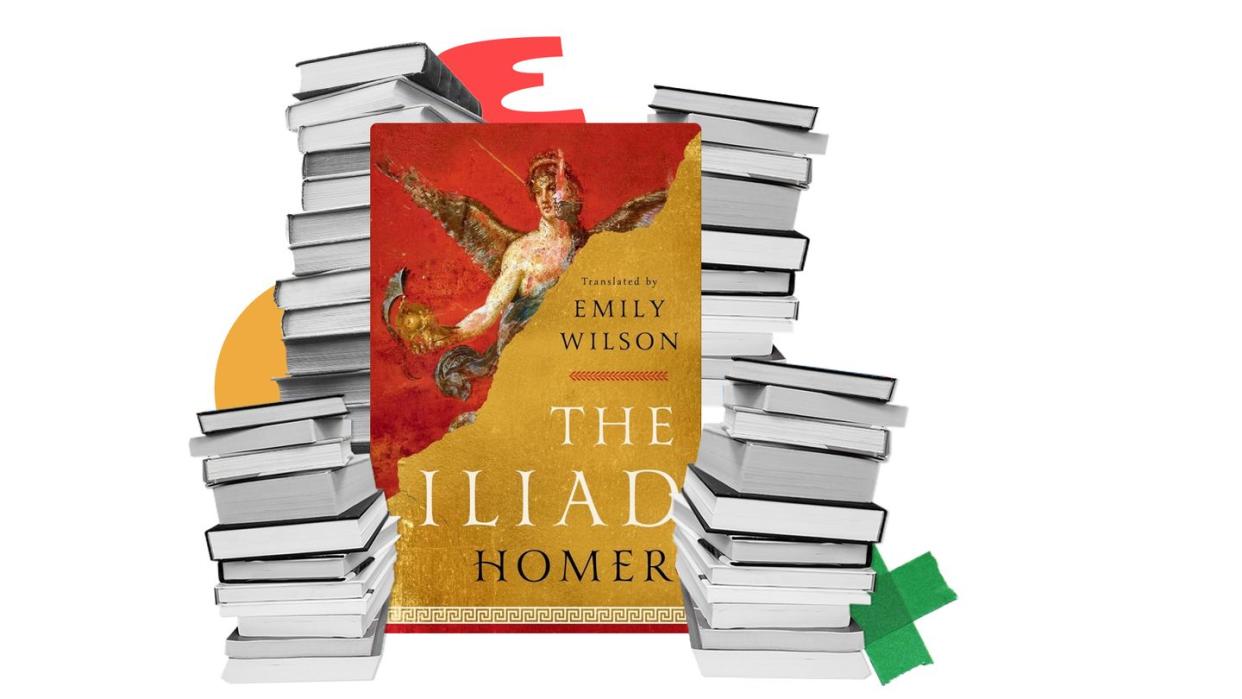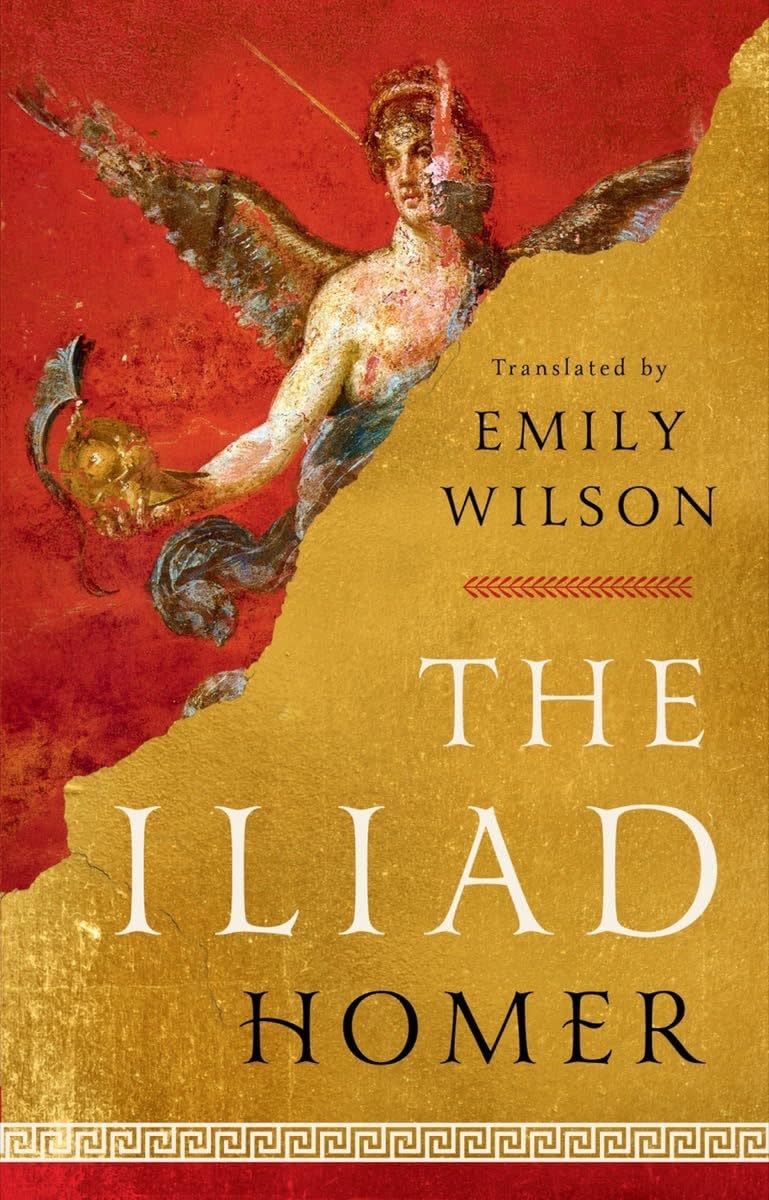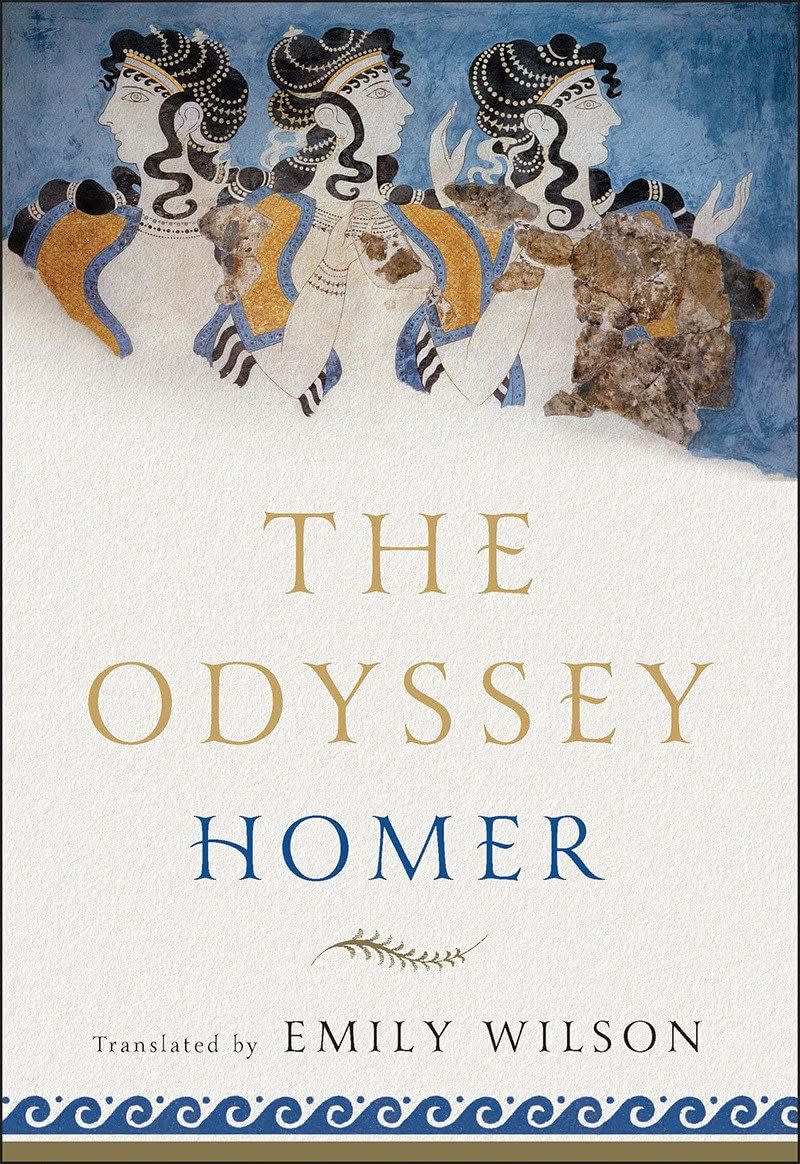Emily Wilson Wants to Make You Cry

- Oops!Something went wrong.Please try again later.
"Hearst Magazines and Yahoo may earn commission or revenue on some items through these links."
Few names loom larger over literature than Homer. The great blind bard was purported to have lived some 2,700 years ago, wandering Greece as he purveyed his poetics, most famously the Muse-inspired verses of the Iliad and the Odyssey—which laid the very foundation for much of Western literature to come. While the impact is undoubted, this authorship is actually somewhat apocryphal, as there is much debate about Homer’s authenticity and whether or not the stories can fully be ascribed to him. These tales of the Trojan War and the trials of Odysseus have been told and translated by many over the ages, and in a game of telephone so enduring, all bets are off.
Dr. Emily Wilson is the latest to take up the task of translating Homer’s peerless poems. She’s been teaching them for over two decades at the University of Pennsylvania, and her highly acclaimed 2017 English translation of the Odyssey was the first published by a woman—a distinction shared by her just-released Iliad. “I've spent my whole life with the Homeric epics,” she tells Esquire. “I felt I really did have a vision for how to do it differently.”
While the cultural impact of Homer is indelible—allusions to the works appear in everything from Shakespeare to Duck Tales—the vast lifespan of the poems and their chopped and screwed chronology begs a question: where does Homer fit into the modern world? Are the Iliad and the Odyssey dusty Classics, or are the texts still alive and vital three millennia after their composition?
“For a twenty-first-century reader,” Wilson writes in the introduction to her Iliad, “there is nothing unfamiliar about a partisan society riven by constant striving for celebrity dominance and attention, where rage and outrage are constantly whipped up by extreme rhetoric and the threat of humiliation, and where grief and loss constantly bleed into yet more rage and aggression.” The parallels she draws become even more existential: “We are now in a period of crisis not for a specific nation but for humanity, inhabiting a planet that is becoming less and less habitable. A new kind of heartbreak can be felt in The Iliad’s representation of a city in its last days, of triumphs and defeats and struggles and speeches that take place in a city that will soon be burned to the ground, in a landscape that will soon be flooded by all the rivers, in a world where soon, no people will live at all, and there will be no more stories and no more names.”
In the days leading up to the publication of her Iliad, Esquire spoke with Wilson about the urgent value of literacy, the legacy of Homer, and what modern readers can draw from his epic account of Troy. This interview has been edited for length and clarity.
ESQUIRE: It's been nearly 3,000 years since the poems were said to have been composed. How are they still relevant today?
EMILY WILSON: Homer becomes relevant in a different way in every different cultural moment. One of the fascinating things about learning about different translations from different eras is seeing how differently the poems have resonated at different times. For instance, the ways that early modern readers of the Iliad were fascinated by, how is this a poem about different models of government and different models of how the ideal political leader should operate? Is the Greek encampment somehow a model for court culture, or is it a model for how we shouldn't behave? Is Agamemnon an evil tyrant? Is this showing something that's relevant for England in the time of the aftermath of the Civil War? There are various different ways that it's resonated differently for different cultural periods.
In an era of extreme partisanship, the Iliad is about people who are within the same community. It's not about Trojans versus Greeks. It's about Greeks versus Greeks and one deity versus another deity, one Trojan versus another Trojan. It speaks to the way that conflict can become so intense and so destructive for a whole society, especially when it's between people who are as close as Achilles and Agamemnon or Hector and Paris are to each other, or Hera to Zeus.

amazon.com
$35.95
In the introduction to the Iliad, you write that it’s the story of a people dealing with the downfall of their civilization, and you suggest that readers of today might see something of a circumstantial mirror in it.
It’s set in the last year of the Trojan War when part of the whole tragedy of Hector is that he knows he's going to die. He knows his city is going to fall and he’s fighting for this completely doomed quest to save something that he knows is in its last days. The Trojans and the gods all know this plain is going to be uninhabited and uninhabitable soon. All the male warriors of Troy will die, all the women will be enslaved, all the children will be slaughtered. I think it does really resonate in a world that’s going to become so much less inhabitable even just over the course of the next ten, twenty years that we're all living in.
The first time I read the Iliad, I remember being surprised that it doesn’t end with the sacking of Troy, but instead with this heavy moment of grief and mourning. It almost struck me as an anti-war story.
Anti-war, pro-war: the poem presents war as a fact of human life. Aries is an immortal and the conflict is not going to stop being with us. But it's certainly a poem which moves from rage to grief. The whole narrative trajectory within Achilles himself involves this sort of infinite rage of, I shouldn't have to lose anything. I shouldn't have to lose the worst things. I shouldn't have to lose honor. I shouldn't have to lose my life. I shouldn't have to lose the dearest person in the world to me. And yet loss is not actually something that any human—even the son of a goddess—can ever escape.
I think the whole poem is about both grief and rage and the ways that those intense emotions—the most intense human emotions that we can have—are tied up with one another. The rage of the quarrel in the first book, the rage of Achilles at having something taken away from him—his honor and that woman—that rage is inspired by grief and then causes enormous amounts of further grief and further rage because, of course, it inspires massacres both on the Trojan and the Greek side. The rage of Achilles and the grief of Achilles cause more and more deaths, more and more rage, more and more grief. It’s this cycle of rage and grief perpetuating one another.
What exactly does Achilles learn? I mean, I think he knows in theory that he's going to die right from the start, but there's a sort of deepening of understanding of that. So I think there's a sort of emotional journey, the difference between I know I'm mortal, but do I really know it? I may not really know it until I've lived through the things that nobody wants to live through. But we're all going to have to experience things that will destroy us, and then we go on living.
You wrote that to the ancients of the Iliad, “literacy is an unusual skill liable to get people into terrible trouble.” I feel like in a modern world where book bans are ramping up, literacy is once again increasingly viewed as a terrible skill. What do you think about the current attacks on literacy?
In the story of Bellerophon, Bellerophon is carrying these written tablets—he doesn't know what they mean, so he doesn't know that he's carrying a message which says, kill the bearer of this message. He's made very vulnerable by not being able to read.
It seems to me that we're seeing the repercussions of having a society where a lot of people don't know how to read carefully, don't know how to read something longer than a tweet length, don’t know how to read with critical judgment—all these things which ideally you learn in the course of rigorous high school education and through reading big difficult books, like the Homeric epics. You can learn to live in a world where you don't fully understand everything immediately, and it's not just soundbite, soundbite, soundbite—here's a headline. You might need to live with it and grapple with it and wrestle with it for a while before you understand, and you might need to be able to assess different sources of information.
Without proper literacy, it's hard to see how democracy can flourish. People can't make themselves informed citizens if they can't figure out what that message says and the complexities of it and judge between different speakers. These kinds of things, you're taught by the Homeric poems, not here's the soundbite takeaway so that you don't need to bother doing the reading. It's through living with a complex, difficult text that has many voices within it and takes you on this complicated verbal journey that you can learn how to assess language and how to assess different speakers, and not be so vulnerable to be swayed by this speaker got very angry so I will vote for them or make a snap judgment and then not reconsider the snap judgment. Within the world of Homer, it's complex enough that you're always having to reconsider. In ancient times, people very much saw the Iliad and the Odyssey as a kind of training for almost any kind of public life, including leadership or citizenship or being a general in the army.
A lot has been said about your translations being the first by a woman. What do you think about the portrayal of women by Homer?
I think the Iliad has so many more interesting female characters than the Odyssey does, partly because the whole divine apparatus is so much more developed. I mean, the Iliad passes the Bechdel Test: we have so many dialogues between goddesses who don't all have the same point of view or perspective.
I like both the Homeric poems for the way that they're not simplistic about gender and social power. You can be overwhelmingly powerful, as is Hera—the firstborn child of Cronus, whose power is only ever matched by Zeus—or you can be not powerful at all: the enslaved woman who's there with Hector and Andromeda, who doesn't get to say anything because she's just there to hold the baby. There’s the whole spectrum of what it might mean to be female, which is as complex as what it might mean to be male or any other genders.

amazon.com
$11.99
I saw on Twitter that you got tattoos of Achilles’ horses Xanthus and Ballus. Why did you choose them?
I love the horses. I love so many different characters in the Iliad, but they’re certainly two of my favorite characters, as well as the third horse—Pedasos, Jumper, the mortal horse who dies.
I was thinking about tattoos—imagery—that could summarize themes in the Homeric poems. I already have an owl and Hippocamp for Athena. I was thinking about mortality and immortality as central themes in the Iliad and the ways that those horses sort of encapsulate both. They're the galloping horses of swift-footed, short-lived Achilles, and they are a gift from his immortal mother—most people don't get to have horses that can talk. It’s this enormous privilege that he has these magical horses, but of course, he only has them for a little while because he's soon going to be dead and they're still going to be there. All that the privilege of having an immortal legacy can do in that poem is to tell you that you're going to die.
Was there anything in particular that you found challenging about translating the Iliad?
I love the poem so much, and so especially for the first two years I kept thinking, whatever I'm writing is just never going to match up to the original. [The challenge was] just getting over that and being aware that I can feel the fear and live with the failure and do it anyway.
There was this whole set of technical challenges about how long a line is going to be and how am I going to convey the noises and the sounds when the whole vocabulary of noises and sounds and voices and clashes and clangs is all completely different in English versus in Homeric Greek. Those things were very difficult, but then I think even more than that, just the emotional challenge of, I love this poem, and I really want to make this sing, and it's quite difficult to make it sing in a way that's going to be even a fraction as powerful as the original is.
After three millennia, you’d think that the buzz around the Iliad would have died down, but not at all. A lot of people are talking about your translation. It’s kind of an event among the literary community. There has been much debate about it on Twitter both positive and negative.
It hasn’t come out yet, so not everybody has read it. I don’t get into engaging with people who haven’t read it. I feel like it's a sort of nonstarter for debate if people haven't done the reading. I'm thrilled that people care. I love Homer and I want more people to read Homer seriously and to get the way that these huge poems about these big human issues can both help you learn about the past and help you learn about yourself, your own feelings, and our community—how do we process feelings and how do we interact with each other?
I think insofar as it's not just sort of knee-jerk things on Twitter where people haven't done the reading—which I don't think is helpful—but if it really is about serious engagement by more people with the Homeric poems… and also not just with the Homeric poems, but with issues of translation. Because I think there are lots of people, maybe especially in the US, who are very monolingual and don't really think about, how is a text in a different language a different text? Or how is a text that's maybe the same story but told in different words or retold differently, how is that actually very different? I think those issues are actually crucial, again, for democracy, but also for appreciation of cultural literature. Even beyond Homer, I want to have more people talking about translation and big books and close reading.
I'm going to be curious to see what people who've read it seriously will think. I suspect that people may find it quite different from my Odyssey translation. I want it to be different. I feel it's quite different. The original poems are quite different from each other. There’s a sort of whimsicality in some of the scenes in the Odyssey, which I wanted to have come through in my translation. The Odyssey has a sense of playfulness, whereas the Iliad just has this sort of relentless focus on a very claustrophobic and often very dark world where people are having terrible, violent deaths and intense rage and grief and you never really get out of that. You have moments of respite during the occasional comic scene, like Hera’s seduction of Zeus or the funeral games and slipping in the dung, but it doesn't have nearly as many domestic scenes and almost funny scenes as the Odyssey does. I hope people are sort of shocked and feel broken by it. I want to make people cry.
You Might Also Like

